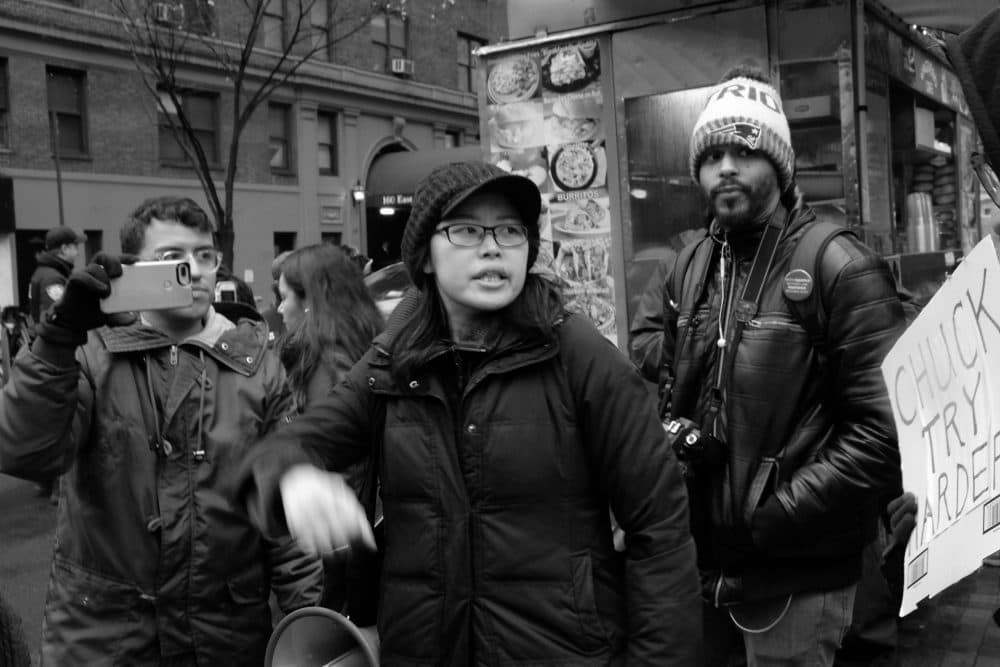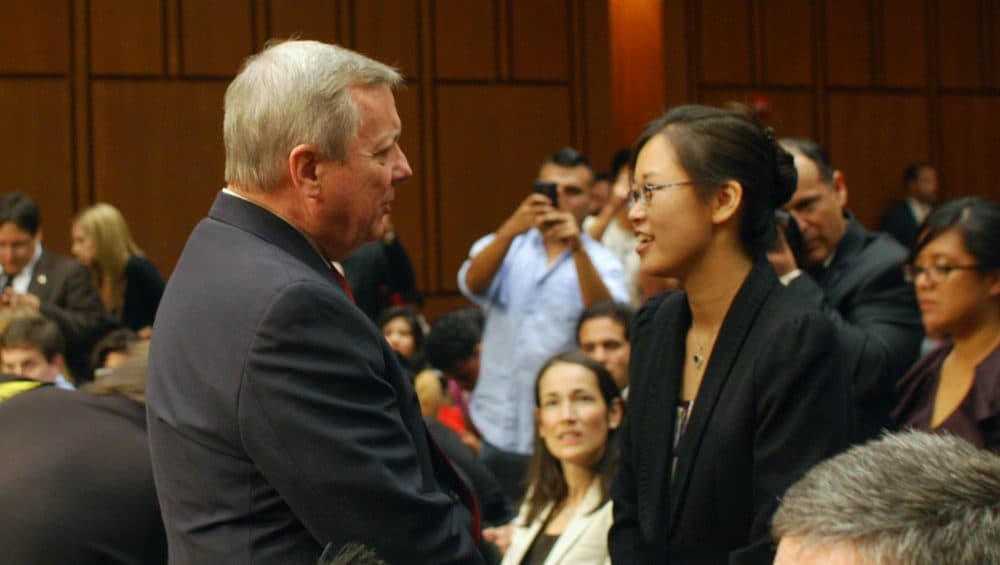Advertisement
Why The 'Original DREAMer' Remains Hopeful Amid DACA's Uncertain Future

Thousands of young immigrants in Massachusetts and across the country are waiting to learn whether they'll be able to stay in the U.S. or if they'll need to return to countries many of them don't consider home.
Congress is working to hammer out a bipartisan deal for these so-called "DREAMers" — people who were brought to the U.S. illegally as children.
The fight over DACA — the Deferred Action for Childhood Arrivals program — appears to be coming to a head this week, but the movement behind the original DREAM Act began nearly 20 years ago when a teenager in Chicago contacted her U.S. senator.
'I Needed To Do Something About My Status'
Tereza Lee says she's an introvert and stepping into the limelight does not come naturally to her. She's had to work at speaking out publicly as an immigrant rights advocate. And back in 2000, her 16-year-old self was working to understand the concept of being undocumented well before the word "DREAMer" was a political term.
"I thought I was alone, and I thought, frankly, we might have been the only undocumented family in the country. I was just, uh, we didn't know," Lee said with a nervous grin.
She says her parents lost everything in the Korean war. They took a chance and moved from Korea to Brazil, where Lee and one of her brothers were born. Things were going well in Brazil until, as Lee says, her parents' bank account was robbed. They lost everything again. So, she says her mother sold her wedding ring, and they brought the family to Chicago for yet another chance at a new life. Eventually, their travel visas expired, but the family stayed.
"All I was thinking of when I was 16 years old was that I needed to do something about my status and my family's status. And what can we do about it? We had to contact Senator Durbin," said Lee.
And so she did.
And in 2001, Democratic Sen. Richard Durbin, of Illinois, and Republican Sen. Orrin Hatch, of Utah, introduced what became known as the DREAM Act. It was supposed to help some children brought to this country illegally to become permanent residents.
Advertisement

Sen. Durbin calls Lee's story his inspiration for drafting the act. Lee says her family was her inspiration.
Lee is now a U.S. citizen, by marriage. As the "original DREAMer" follows the debate on Capitol Hill she remains optimistic that a deal to keep DREAMers in the country can still be reached.
Here's our recent conversation with Lee, lightly edited:
Tereza Lee: What we grew up with was the fear of separation. And especially because we were undocumented, we were so isolated from the outside world, and that brought our family closer together.
Shannon Dooling: I've seen you speak about that isolation before. Do you see how that isolation has had an impact on the path that your life has taken?
Yes, absolutely. The fact that we were undocumented, we didn't want to risk our family so we could not talk about it with anyone else outside of our families. We just were so afraid that it might just slip out of our tongues. We almost became completely muted to the outside communities, and once we stepped outside of the house we did our best not to talk unless it was absolutely necessary. So, that kind of isolation definitely has a very, an all-pervasive impact in our lives, daily lives.
"We just were so afraid that it might just slip out of our tongues. We almost became completely muted to the outside communities ..."
So, talking about that pervasive isolation it makes me think about some of the families and some of the young people that I've been talking to over the last year now that immigration has really jumped into the foreground of our country in a way that it hasn't in quite some time. What are your observations about the current sort of lay of the land?
First, I want to address the movement. It wasn't until around 2005 when the first surveys came out about how many undocumented immigrants there actually was in this country, and that number was about 100,000 people. In 2007, new numbers came out and said actually there are millions of undocumented people. People started coming out to say, 'I am undocumented and unafraid, and this is what is actually happening in our communities.' And those seeds have been growing for years and year and years, for about a decade. And that's where we are right now with Trump's administration that is escalating the attack on the immigrants. The attack on immigrants was already happening before Trump.
"The attack on immigrants was already happening before Trump."
So, your assessment might be that living as an undocumented immigrant under a Trump presidency is just as stressful and scary and uncertain as it has ever been in the U.S.?
Yes, absolutely. It's always been uncertain. I am seeing under Trump's administration that a lot more people are coming out with the hate and the racist rhetoric. However, I just want to point out that the DREAM Act right now has a public support of 83 percent. Public support happened because of the movement of the DREAMers coming out and sharing their stories, and now the public is understanding more that we are their neighbors, and their friends and classmates, and their teachers and co-workers. And that is a win for the immigrant community right now. We need real legislation passed to protect the DREAMers, and then eventually the comprehensive immigration reform.
"Public support happened because of the movement of the DREAMers coming out and sharing their stories, and now the public is understanding more that we are their neighbors, and their friends ... "
What is your message then to current DREAMers who are living in that uncertain, unsure, anxious place right now?
I think there is a lot of hope, and just looking at the percentage of how many people support us and the immigrant community, I hope that they will be encouraged and become active. That was one of the greatest things for me, to discover because we shared the same experience of growing up living in the shadows, I realized that I was not alone.
This segment aired on January 18, 2018.
